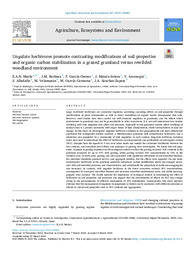Título :
Ungulate herbivores promote contrasting modifications of soil properties and organic carbon stabilization in a grazed grassland versus rewilded woodland environmen |
Autor :
Marks, E.A.N.
Barbosa, J.M.
Garcia-Orenes, Fuensanta 
Mataix-Solera, Jorge 
ARCENEGUI, VICTORIA 
Albolafio, S.
Velamazán, M.
García-Carmona, Minerva
Sanchez-Zapata, Jose Antonio  |
Editor :
Elsevier |
Departamento:
Departamentos de la UMH::Agroquímica y Medio Ambiente |
Fecha de publicación:
2024 |
URI :
https://hdl.handle.net/11000/33740 |
Resumen :
Large vertebrate herbivores are ecosystem engineers, provoking cascading effects on soil properties through modifications of plant communities as well as direct modulation of organic matter incorporated into soils. However, most studies have been carried out with domestic ungulates in grasslands, and the effects which predominate in grasslands may not be generalizable to other ecosystems. It is not well understood how trophic rewilding with wild ungulates may affect soil processes, especially in non-grassland systems albeit rewilding of natural areas is a process associated with larger trends of land abandonment, shrub encroachment or land use change. In this study we investigated ungulate herbivore exclusion in two geographically and pedo-climatically equivalent but ecologically distinct contexts: a Mediterranean grassland with domesticated herbivores, and a reforested area populated by a community of wild ungulates. In each context, long-term herbivore exclusion zones were used to understand the effect of herbivores on soil properties and particularly on soil organic carbon (SOC). Samples from the topsoil (0–5 cm) were taken inside and outside the exclosures distributed between the two contexts, and ecosystem-level effects and responses to grazing were investigated. We found that soil properties’ response to grazing depended on the ecological context in which the grazing occurred. SOC contents in the grassland increased by up to 37% with grazing, while grazing reduced SOC concentrations by 23% in the rewilded area. In both cases, grazing was also associated with significant alterations of soil microbial biomass, the microbial metabolic quotient (qCO 2 ), and aggregate stability, but the effects were opposite: On one hand, domesticated herbivores in the grassland positively influenced carbon stabilization which was strongly associated with soil microbial processes and characteristics, and additionally the proportion of stable macroaggregates was increased. In contrast, wild ungulate herbivory in the forest ecosystem reduced SOC concentrations, accompanied by decreased microbial biomass and increased microbial maintenance costs, and stable macroaggregates were reduced. The results indicate the importance of ecological context in determining the effect of herbivores on soil properties and processes and suggest that the directionality of effects on SOC may change owing to the predominance of different mechanisms of SOC stabilization. Consequently, this study provides evidence that the management of ungulates in rangelands or forests can be associated with different outcomes as related to crucial soil properties such as SOC contents and aggregation.
|
Palabras clave/Materias:
Microbial biomass carbon
Microbial metabolic quotien
Macroaggregates
Soil quality |
Área de conocimiento :
CDU: Ciencias aplicadas: Agricultura. Silvicultura. Zootecnia. Caza. Pesca |
Tipo de documento :
info:eu-repo/semantics/article |
Derechos de acceso:
info:eu-repo/semantics/openAccess
Attribution-NonCommercial-NoDerivatives 4.0 Internacional |
DOI :
https://doi.org/10.1016/j.agee.2024.108983 |
Publicado en:
Agriculture, Ecosystems and Environment 367 (2024) |
Aparece en las colecciones:
Artículos Agroquímica y Medio Ambiente
|
 La licencia se describe como: Atribución-NonComercial-NoDerivada 4.0 Internacional.
La licencia se describe como: Atribución-NonComercial-NoDerivada 4.0 Internacional.
.png)
